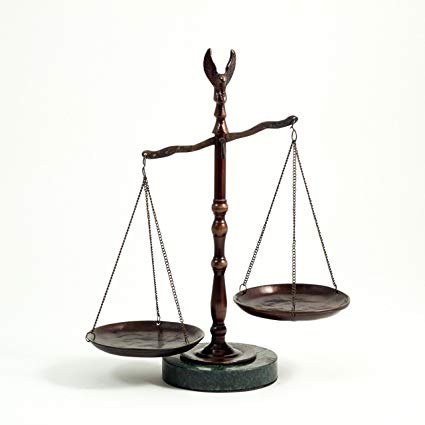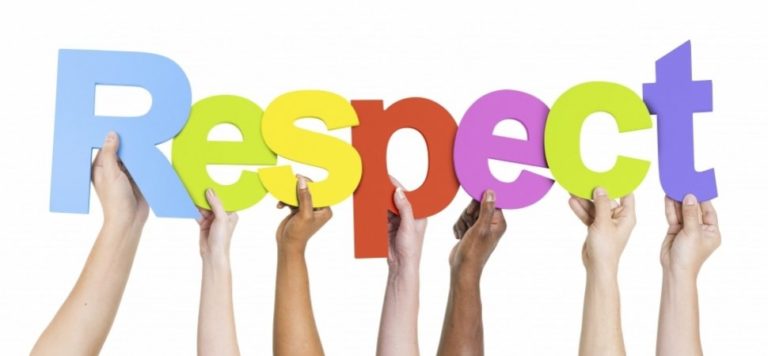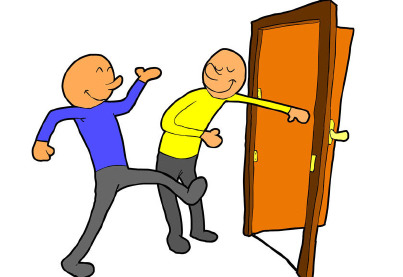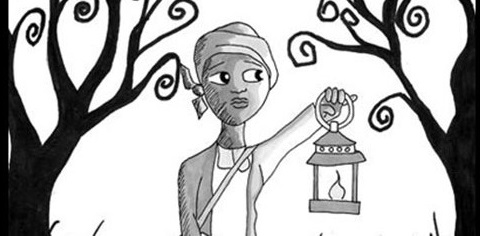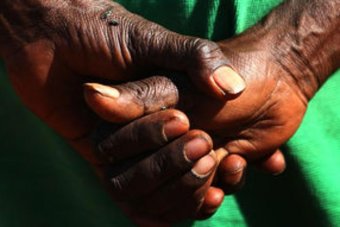What does respect mean to me? Respect for me is a deep feeling that influences the way one treats someone who they consider important. Positive feelings and feelings of admiration for that someone are conveyed through actions and speech. Respect for me is reserved for those who I feel are deserving. I believe that true respect, the type of respect that comes from the heart, is built through a bond of mutual admiration and understanding between two people. Being polite, honest and obedient to someone else; not just to impress them, not to receive something in return, not because of their title or because of societal norms and expectations, but because you have a genuine relationship and could not imagine treating them any other way. Respect is not only reserved for those who are superior or who have authority over you. I believe one must give respect in order to receive it. True respect is mutual and at the core of all good relationships. Being courteous and having good manners is very different than truly respecting someone. Respect is personal and connects one’s own values, morals, opinions, views, experiences, and feelings with someone else’s. Good manners and courtesy should be taught and practiced by all, but true respect cannot be taught and does not have to be expressed the way others want. True respect comes from within, it is all yours to give and cannot be dictated by anyone but yourself.
Children’s Articles on Respect
A time I showed respect was when we had a fun day at Water World with YETY. I had so much fun jumping, eating frozen cones and running around with my friends. After, when it was time to go home, I said thank you to the older counsellors because we were happy about what they did for us, except I didn’t hear everyone say thank you. An Omoluabi is a child of character and knows how to be respectful when there are people around but also when no one is looking. I knew it was the right thing to say thank you for having a fun day because they didn’t have to go out of their way to do that for us.
By: Hamudi Mohamed
Mohamed, age 7
A story I have about respect would be when the Windsor Express Owner and Head Coach came to talk to us. I think it was awesome how from the minute they came in and introduced themselves some guys got up to shake their hands to say hello and thank them for coming. I believe that is how children of character show respect because a child of character is supposed to be a respectful child, so when someone older than you is in your presence, you acknowledge them by shaking their hand and greeting them. It is also how we were raised to behave living in African households. It was always taught to many of us when your aunts, uncles, or parents friends come over, we have to go say hello to them and shake their hands as a sign of respect.
By: Sebi Said, age 14
Respect is an action you do to show that you are listening or understanding what they want you to do. Respect is something you do to show moral fibre. When you show respect, you are showing you are a good person and you listen and comprehend people. I think respect means to comprehend, understand and listen to not only yourself but others. The first way you need to know how to show respect is to respect yourself. In this article I will tell you what I think it means to show respect, verbally and on the web.
First, I will talk about showing respect to oneself. That is the first one you must learn in order to respect others. Respecting yourself means you take care of yourself, you love yourself and avoid doing anything bad that might hurt you. Taking care of yourself means you don’t do things like smoking, drinking alcohol or trying to change your appearance. God made you who you are, be proud of it! Another way to respect oneself is to not bully or hate yourself. If you can do all this then you might be able to respect others and get along with them.
The second one is showing respect to others. Showing respect to others mean not fighting, waiting your turn and getting along with others. To me, showing respect to others means getting along with everyone. Be friendly, kind, gentle and empathetic. Another way is to respect others time; don’t waste it! Be considerate of people’s feelings, don’t make fun of someone behind their back. What if that was you? Would you like people talking about you behind their back?
The third one is showing respect on the internet. Showing respect on the internet is trying not to cyberbully anyone. Do the same thing as showing respect to someone in person, but on the internet. Be friendly, use proper language and be nice. If someone tries to provoke you, don’t fall for it and just get off the site. Don’t be a bully. If you see any bullying, go call an adult or report that person. This type of behaviour is frowned upon. Don’t be a bully or a bystander. Stand up for people or report it.
That was what respect means to me. To be respectful to oneself, to be respectful to others and to be respectful to others on the internet. These three things are very important because they will help you avoid trouble in life. This is what respect means to me. Thank you for reading this article.
By: Francine Babo age 11
When I think of respect it reminds me of Aretha Franklin’s song,
“RESPECT”. When you earn respect from people it validates who you are, and the faith people put in you. You are trustworthy. You are above reproach and have integrity. Someone has put their faith in you and will vouch for you; they will recommend you to others; they will put their own reputation on the line for you. They are counting on you to live up to their expectations because they value who you are and can count on you.
By: Christopher Hill, age 11
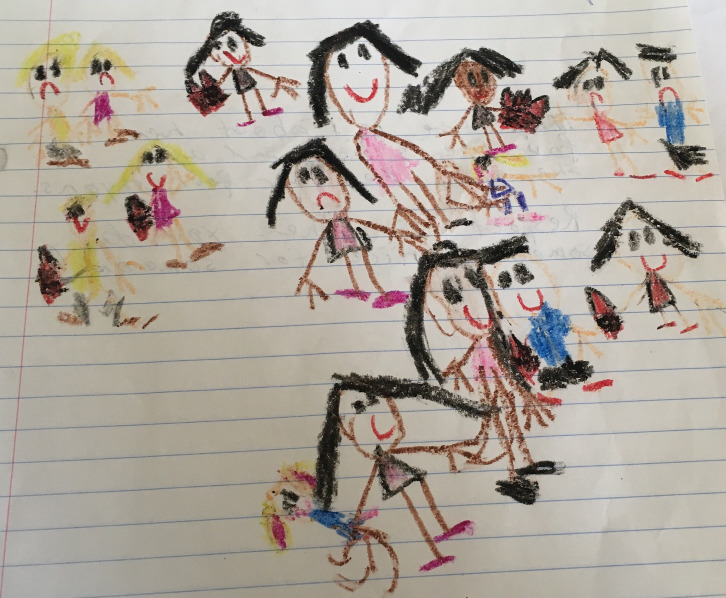
Melanie’s picture is about her four friends being sad, so she decided to give them her four crayons.
For Melanie, respect is when you do something nice for someone.
Melanie, age 6
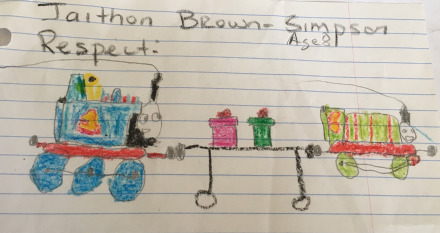
Jaithon’s picture is about Thomas sharing gifts with his best friend Percy.
For Jaithon, respect means to share and say “good job “ to others when they do something nice.
Jaithon, age 8
Respect and the Law
The Omoluabi principle of “iteriba” means respect. Respect is not a new concept, nor one that is exclusive to the Yoruba culture. It has been around for as long as humans existed and is important to all sorts of human interactions. Respect takes on a particularly important role in the legal system. Without respect for ideas, processes, and the various participants, the legal system would not function the way it does.
A participant in the legal process must first respect the process. After receiving a decision that was personally unfavourable, Clayton Ruby, one of Canada’s best known lawyer remarked, “respect for the judicial system sometimes requires that a litigant accept that their view of things just does not prevail.” The fact of the matter is that sometimes a party in the judicial system wins and other times they lose. Despite this, parties involved must respect the system in order for it to continue.
Additionally, the legal system displays the concept of “iteriba” in the courtroom. The courts are adversarial with two parties opposing and challenging each other’s ideas. The adversaries are refereed by a judge who can only rule in favour of one of the parties. Nevertheless, the courtroom is a place of high decorum, formality, and (usually) great respect from all parties involved.
Good lawyers learn to respect their opponents and the judge, even when they disagree. Furthermore, good judges respect the lawyers and the role they play in the judicial system. Beyond that a litigant also learns to respect the system. The way in which they address the court and carry themselves is most important.
There are few places where the concept of “iteriba” is as well mirrored as in the courtroom. The court system is a great place to learn and perfect this value, particularly in a setting where one may not easily be inclined to display it.
Respect
Respect is not a law, but it is obtained. It means that if you don’t respect people, people will not respect you. Remember the proverb that says, “don’t do to someone what you would not want done to you”. All this is to say that when you are disrespectful to someone, that person will be disrespectful to you too. Yet if you are respectful to a person, many other people will be respectful to you. For example, in my class there are people who always disturb the class when the teacher speaks and cut him off. Sometimes it annoys me because the whole class will end up being punished. But sometimes, when all these disrupters act righteously, our teacher is ready to reward the whole class, and this makes me happy to the point where I interact with these disturbers more frequently. Respect is a practice and not just a word. What do I mean by that? Well, if we tell you that you must learn to respect others but do not do it, what are you doing? Do you think that telling people that you will begin to respect them will make them respect you right away? NO! These people will wait to see you putting your own words into execution, they will wait to see you respect even those who hate you. Finally, respect can be defined in one word, politeness. If you think to respect others but not to be polite, it means that you are not respectful. I encourage everyone to respect each other because it is the key to a solid union.
Learning Respect by Example
A few weeks ago, a couple of my friends and I were hanging out in front of the Water World entrance, when a group of elderly women began walking towards the doors. My friends and I happened to be in the way of the door and blocking their access. One of my friends said “hey, move to the side”, and proceeded to hold the door and instructed me to hold the next door inside for them, so they wouldn’t have to go out of their way to hold the door for themselves. In my eyes, those were traits of an Omoluabi, because a child of character is supposed to be a respectful child. My friend showed me he was a child with respect. He showed me this because he did the right thing by correcting us and telling us to accommodate the elderly women’s needs of moving out of their way and holding the doors for them.
The Way of Life – Respect
When you were just a child, what did your parents usually say when you were playing with your friends? “Play fair” or “Girls can play with boys toys too” and vice versa. Well, when you get a little older, you start to realize that there is a word for such kind actions that hopefully you listened to. That wonderful word is Respect!
As you grow up you go to kindergarten, this is where they teach you more about respect. For example: learning how to effectively use the Golden Rule, using your manners when necessary, sharing, etc. Then you enter the first grade and school and is now a regular activity you may start to enjoy, and you begin to make more and more friends. Learning to respect you classmates, adults and teachers, just because they look a certain way doesn’t mean everyone has to look and behave in that way (everyone is different).
From now until who knows when, you will continue to realize you must first respect yourself before others may respect you.
Teenagers nowadays sometimes don’t make the healthiest choices in order to live their life to the max. Teenagers get into problems like: Drugs and alcohol, become sexually active, use social media to hurt and disrespect others, have aggressive and abusive tendencies and much more. As young adults, older teenagers need to set the example for younger kids so that they may be able to respect you and learn more about how they can use that to be respected themselves.
This can be a very great skill to have and to take pride in. Being respectful isn’t something you can just wake up and have, it’s something you earn and or gain. On the other hand you can also teach others to respect others and that’s the whole purpose of being an older person; being there to teach younger kids right from wrong.
Ask the Elders: Issue 3
1.What fascinates you in today’s
society?
I enjoy doing many things in society. I enjoy going to church and helping people. I grew up in the church and the way we used to worship in Africa is different than the way we worship here. The music and types of songs we sing are different in Africa. I also enjoy getting together with people and discussing different things and trying different food, like with the Tea Time with the Senior that Mrs. Afolabi puts on.
2. What kinds of challenges do you face was seniors?
don’t do as many things as I used to when I was younger. When I was young I used to walk a lot and now I cannot walk around as much. People come to help me with my laundry and other chores. I also have more health problems. When I was young I never got ill and had good health, but now that I am getting older I have more issues with my health.
*Questions by Joyce Kalinga and
answers by Mrs. Elizabeth Achirimbi
Black History: “Iteriba” Respect
“To be free is not merely to cast off one’s chains, but to live in a way that respects and enhances the freedom of others.” – Nelson Mandela
The Yoruba word, “Iteriba” has several meanings, but today let us focus on just one of the meanings, the attribute of “respect.” In this column, we’ll focus on some people who often do not receive very much respect—people whose heroism, strength, and determination is too often overlooked.
We are the heirs to the courage and ingenuity of our Underground Railroad ancestors. Sometimes, people describe them dismissively as “runaways” or “fugitive slaves” but these were self-emancipating formerly enslaved Africans. Slave revolts and escapes were the chief means whereby enslaved people could work to overthrow the unjust system of slavery. Thousands of formerly enslaved Africans freed themselves and made their way to Canada. The Government of Canada estimates that about 30,000 people of African descent, most of them formerly enslaved people, came to Canada during the height of the Underground Railroad. Many of them crossed the Detroit River and landed here in Essex County, be it in Amherstburg, Sandwich or Windsor.
Our Underground Railroad ancestors were not passively sent North by conscientious Underground Railroad organizers. They took the initiative to free themselves from slavery. They did this despite great danger. They did this without the benefits of modern technology, often without money and appropriate footwear or clothing for their travels and almost always without the advantage of literacy and maps. Rarely had they been so far away from the places they were held captive. All had been born and raised in a system that was designed to keep Black people subservient and afraid. Where systematic terrorism and torture made examples of people who didn’t follow the rules.
Here in Essex County, the formerly enslaved emigrants were eager to get directly to the business of clearing forests, farming, building roads and railroads, practicing their trades, opening shops and businesses, sending their children to school for the first time, attending classes themselves, and living their lives with passion and determination.
Their journey to freedom may have ended here but they spent the rest of their lives helping to build all of the things that we now take for granted.
Intrigued by the way they contradicted the stereotypes about what Black people were capable of achieving, the formerly enslaved Africans of Essex County were studied, observed and written about by both British and North American scholars.
One way in which we can pay respect to the memory of fellow Africans, who lived in slavery throughout the ages as well as those who freed themselves, is to ensure that no one is ever subjected to the slave trade again.
Chinua Achebe once wrote that “a man who pays respect to the great paves the way for his own greatness.” It is true that we can find immeasurable strength, power, and inspiration in the stories of our ancestors. Many readers of this newspaper will be familiar with the traditional West African symbol of the Sankofa. This symbol is based on a mythical bird with its feet firmly planted forward while its head is turned backwards. It represents the belief that wisdom from the past ensures a strong future. As we remember the giants of our past, our ancestors, our predecessors, we can and should be inspired by their heroism as we find our way forward.
Respect their memory and allow that knowledge to help you stand taller and hold your head higher every day.
The Sense of Respect
I would say respect is the act of treating others the way you want to be treated. Respect is to recognize the ability and limit of others while still hoping for their success. It must be noted that it is not only limited to a certain group of people, but to everyone; not just something you force but is intentional. Respect can be the key to several opportunities. It’s easy to say the respect we share has been given to us since our childhood. One could insinuate that respect is one of the many keys opening the various doors of opportunity presented along this long and difficult road which is our life and our evolution into adulthood. Respect should not be just a word in the mouth. It’s like waking up in the morning, taking a walk outside (if you want to) and greeting each person with a big smile and an authentic hello, and even making friends with them. Show equality that can be interpreted in various ways such as politeness, cleanliness or punctuality. Knowing that our generation is a bit too invested in social media and are almost obsessed with it, it is more important that our parents incorporate respect into their children so that they adopt this notion, especially in their daily life.
Respect
As a child we should always respect our elders. Don’t make your parents angry because they were the ones who took care of you when you were little. They sacrificed all their need and hobbies to support you and give you a better future.
Seniors doesn’t only refer to our parents. It also means our teachers, our grandparents, our brothers, our sisters or even all those who meet us on the road who are older than us. So we must always respect our elders and help them too.
In any condition we must never raise our voices against them or argue. We must always have our gratitude and love for them.
Above all, we should respect our elders because they are much older than us. Never call your elder by his family name, say ‘Mister’ or ‘Miss’.
If we are sitting comfortably on a chair and a senior is standing near you, always offer them your seat. Listening carefully while they speak is important and their questions must be answered respectfully whenever they ask us for something with a calm tone. They are older than us and they certainly know a lot more about life. If we take advantage of their experiences, we will have a more secure life. Then, when we are older, we would like to have the same respect for our younger siblings. We will learn many more things and gain a lot more knowledge from them who feel loved and respected. Our seniors have surely experienced things that you could hardly imagine. They experienced little comforts like cell phones and computers like we have today. All the knowledge you gain will help you become better citizens and have a more fulfilling life


